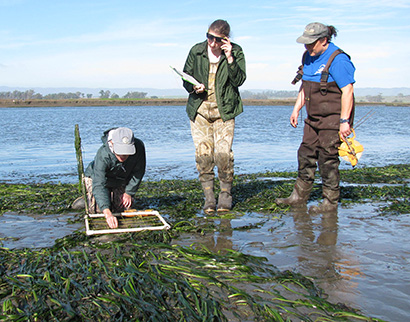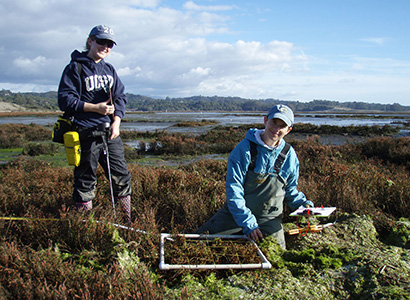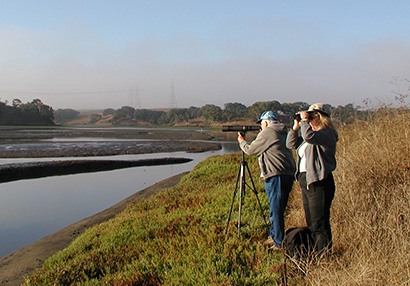Campus News
Study supports increased funding for long-term ecological research
Despite critical importance to scientists and policymakers, funding for long-term ecological and environmental studies has declined while funding for short-term studies has increased.



Funding for long-term ecological and environmental studies has been on a downward trend for more than a decade, yet such studies are of critical importance for advancing the science of ecology and for informing policy decisions about natural resources and environmental issues. These are among the conclusions of a new analysis published in the March issue of BioScience.
“If ever there was a time for long-term studies, this is it, because they are especially important for our understanding of how ecosystems will respond to climate change,” said corresponding author Mark Carr, a professor of ecology and evolutionary biology at UC Santa Cruz.
Carr acknowledged that funding agencies such as the National Science Foundation (NSF), the leading funder of ecological research in the United States, face a difficult challenge in trying to strike a balance between long-term and short-term studies. Ecologists have grown increasingly concerned, however, about reductions in funding for long-term research. So Carr, with coauthor Peter Raimondi and their lab group, decided to conduct a thorough analysis to determine just how important such studies are.
To assess the value of long-term studies to the field of ecology, the researchers evaluated the relationships between study duration and citation rates (how often a study is cited by other scientists, a commonly used measure of the scientific value of published research). They also looked at the contribution of long-term studies to the citation rates of high-impact journals (a scientific journal’s “impact factor” is a measure of how frequently its articles are cited).
The results clearly showed that long-term ecological and environmental studies are more frequently cited than short-term studies. The researchers also found a strong positive correlation between a journal’s impact factor and the number of long-term studies it publishes relative to short-term studies.
“Long-term studies are cited more and they show up more often in high-impact journals, which really shows their importance to the science of ecology,” said first author Brent Hughes, an assistant researcher in the Institute of Marine Sciences at UC Santa Cruz and a David H. Smith Research Conservation Fellow at Duke University.
NRC Reports
To evaluate the importance of long-term studies for informing policy, Carr enlisted the help of colleagues at Oregon State University led by professors Bruce Menge and Mark Novak. Their approach focused on the highly influential reports produced by the National Research Council (NRC). Each NRC report provides a synthesis of the scientific literature on a topic for the specific purpose of informing policymakers.
The study found that NRC reports on ecological topics relied more heavily on long-term studies than on short-term studies. In a follow-up survey, the authors of NRC reports overwhelmingly affirmed that long-term studies were especially important for informing management and policy recommendations. The survey also highlighted a mismatch between the demand for such studies and their availability.
“We’re hoping that funding agencies will look at this and recognize that the investment in long-term studies is critically important for informing policy and making sound management decisions for our natural resources and ecosystems,” Hughes said.
In the past, long-term ecological monitoring programs have been criticized for simply gathering data without addressing important questions. But more recently, Carr said, ecologists have put a lot of thought into how to maximize the value of long-term research programs. “Several papers have made suggestions for how to design good long-term studies, and we summarized those to provide guidance to the scientific community,” he said, noting that the projects funded by NSF’s Long Term Ecological Research (LTER) Program have been exemplary.
In practice, said Hughes, the science of ecology requires both long-term monitoring and short-term experiments. “We use data from long-term studies, which allows us to see patterns in nature and develop hypotheses, and then short-term experiments to get at the mechanisms behind the patterns we see in the long-term studies,” he said.
Hughes has done much of his research in the Elkhorn Slough National Estuarine Research Reserve, and he said one reason it is such a valuable ecosystem for research is the existence of long-term data sets, some going back 80 to 90 years. “For me, it’s been crucial to have that kind of data available, and the value of those data sets increases the longer they continue. That’s why it’s so important to maintain funding for long-term monitoring programs,” he said.
This project was supported by the Comparative Analysis of Marine Ecosystem Organization (CAMEO) program, jointly supported by NSF and NOAA Fisheries, the National Estuarine Research Reserve Graduate Research Fellowship, and the David H. Smith Conservation Research Fellowship through the Cedar Tree Foundation.